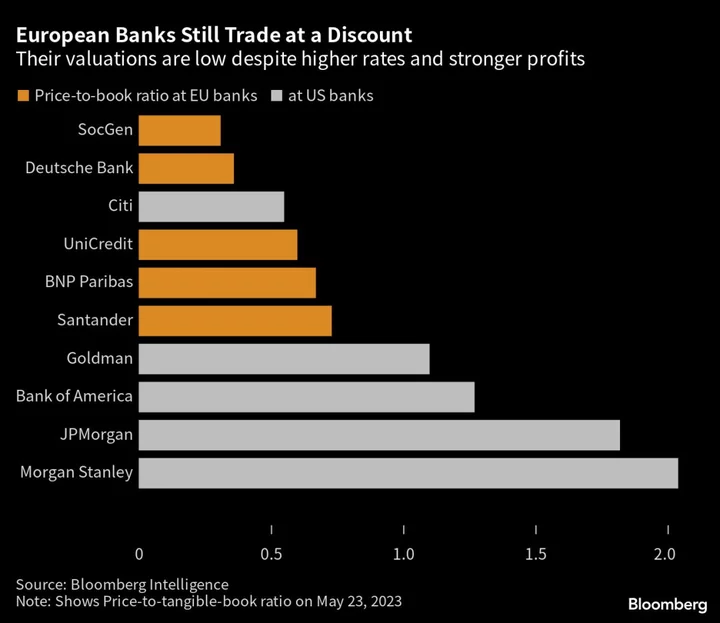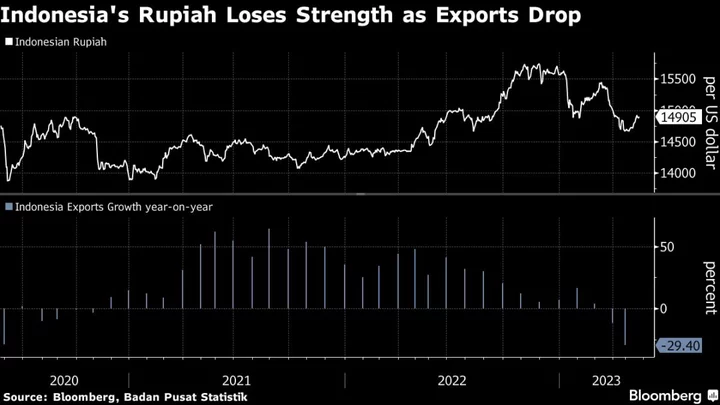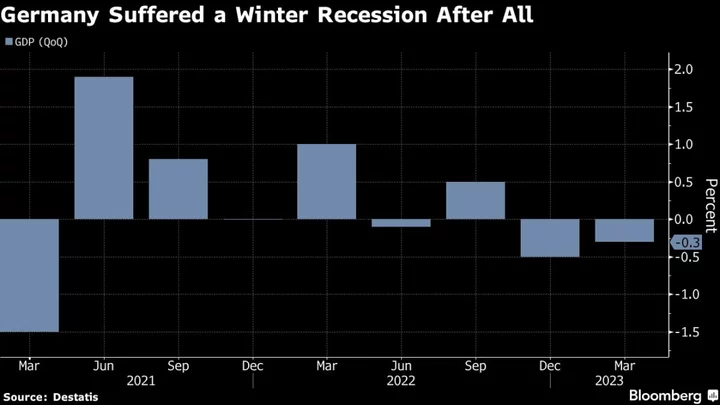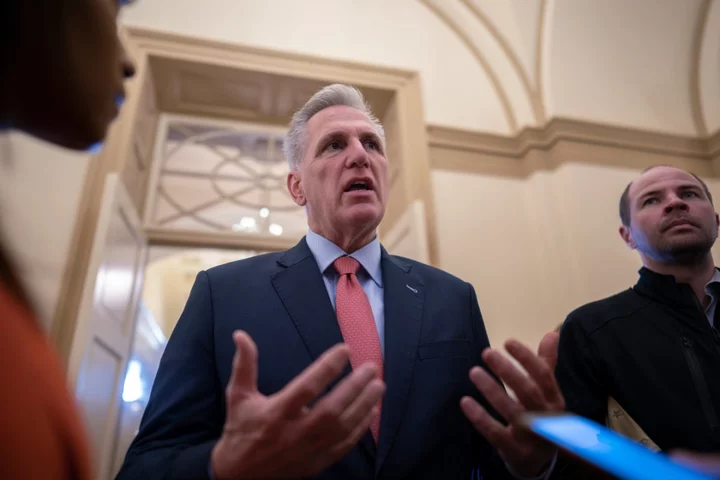
As Trump’s Classified Documents Probe Wraps Up, Potential Charges Are Near
Special Counsel Jack Smith is wrapping up his investigation into former president Donald Trump’s refusal to return classified
2023-05-25 17:28

Bank of America redeploys 40 Asia bankers as China dealmaking stalls
HONG KONG Bank of America Corp has told around 40 bankers in Asia to look for new roles
2023-05-25 17:28

Europe’s Banks Say They’re Back. So Why Doesn’t Anyone Buy Their Shares?
PacWest Bancorp lost $1 billion in one quarter, saw its stock drop 89% in two months, and has
2023-05-25 17:17

Mozambique Ex-Finance Chief Faces US Trial in Tuna-Bond Case
Mozambique’s former Finance Minister, Manuel Chang, is set to face charges in the US over his role in
2023-05-25 16:26

Microsoft UK Veto Versus EU Nod Poses Questions, Vestager Says
The European Union’s decision to approve Microsoft Corp.’s $69 billion plan to buy Activision Blizzard Inc. while the
2023-05-25 16:24

Bank Indonesia Holds Rate Steady Even as Risks to Rupiah Mount
Indonesia’s central bank held its benchmark interest rate for a fourth straight meeting, even as a deadlock in
2023-05-25 15:53

Germany Suffers Winter Recession on Bleaker First Quarter
Germany suffered a winter recession, fresh data showed, extinguishing hopes that Europe’s top economy could escape such a
2023-05-25 14:46

Billionaire Reuben Brothers Win Battle Over Russian Fraud
A New York court has found that the billionaire Reuben brothers were defrauded by a family friend of
2023-05-25 14:19

Oil Industry’s Longest-Serving Chairman Seeks Another Four Years
Antonio Brufau, the oil industry’s longest serving chairman, is poised to keep going despite an earlier pledge to
2023-05-25 13:27

McCarthy's Republicans push debt ceiling talks to brink, lawmakers leaving town for weekend
House Republicans are pushing debt ceiling talks to the brink, displaying risky political bravado as they prepare to leave town Thursday for the holiday weekend just days before the U.S. could face an unprecedented default that could hurl the global economy into chaos. A defiant House Speaker Kevin McCarthy said the debt ceiling standoff was “not my fault” as Republican negotiators and the White House failed to finish out talks. He warned they need more time to try to reach a budget-slashing deal with President Joe Biden. But it's clear the Republican speaker — who leads a Trump-aligned party whose hard-right flank lifted him to power — is now staring down a potential crisis. Lawmakers are tentatively not expected back at work until Tuesday, just two days from June 1, when Treasury Secretary Janet Yellen has said the U.S. could start running out of cash to pay its bills and face a potentially catastrophic default. Fitch Ratings agency placed the United States’ AAA credit on “ratings watch negative,” warning of a possible downgrade because of what it called the brinkmanship and political partisanship surrounding the debate over lifting the debt ceiling. "This is a battle between extremism and common sense,” said Democratic Rep. Katherine Clark of Massachusetts, the minority whip. The Republicans, she said, "want the American people to make an impossible choice: devastating cuts or devastating debt default.” Weeks of negotiations between Republicans and the White House have failed to produce a deal — in part because the Biden administration never expected to be having to negotiate with McCarthy over the debt limit, arguing it should not be used as leverage to extract other partisan priorities. McCarthy is holding out for steep spending cuts that Republicans are demanding in exchange for their vote to raise the nation's borrowing limit. The White House has offered to freeze next year's 2024 spending at current levels, but the Republican leader says that's not enough. “We have to spend less than we spent last year. That is the starting point," said McCarthy, R-Calif. Failure to raise the nation’s debt ceiling, now at $31 trillion, would risk a potentially chaotic federal default, almost certain to inflict economic turmoil at home and abroad. Anxious retirees and social service groups are among those already making default contingency plans. Even if negotiators strike a deal in coming days, McCarthy has promised lawmakers he will abide by the rule to post any bill for 72 hours before voting — now likely Tuesday or even Wednesday. The Senate, where Democratic Majority Leader Chuck Schumer has vowed to move quickly, would also have to pass the package before it could go to Biden’s desk to be signed into law, right before next Thursday's possible deadline. The contours of a deal have been within reach for days, but Republicans are unsatisfied as they press the White House team for more. In one potential development, Republicans may be easing their demand to boost defense spending, instead offering to keep it at levels the Biden administration proposed, according to one person familiar with the talks and granted anonymity to discuss them. The Republicans may achieve their goal of of rolling back bolstered funding for the Internal Revenue Service if they agree to instead allow the White House to push that money into other domestic accounts, the person said. At the White House, press secretary Karine Jean-Pierre blamed Republicans for risking a devastating default that would hit “every single part of the country” as they demand “extreme" spending cuts that would hurt millions of Americans. She decried what the administration called a “manufactured crisis” set in motion by the GOP. The White House has continued to argue that deficits can be reduced by ending tax breaks for wealthier households and some corporations, but McCarthy said he told the president as early as their February meeting that raising revenue from tax hikes was off the table. Donald Trump, the former president who is again running for office, has encouraged Republicans to “do a default” if they don’t get the deal they want from the White House. Time is short to strike a deal. Yellen said Wednesday that “it seems almost certain” that without a deal the United States would not make it past early June without defaulting. “We are seeing some stress already in Treasury markets,” she said at a Wall Street Journal event. While Biden has ruled out, for now, invoking the 14th Amendment to raise the debt limit on his own, Democrats in the House announced they have all signed on to a legislative “discharge” process that would force a debt ceiling vote. But they need five Republicans to break with their party and tip the majority to set the plan forward. “Sign the bill!” Democrats yelled on the House floor after Republican Majority Leader Steve Scalise of Louisiana announced the holiday recess schedule. Agreement on a topline spending level is vital. It would enable McCarthy to deliver spending restraints for conservatives while not being so severe that it would chase off the Democratic votes that would be needed in the divided Congress to pass any bill. But what, if anything, Democrats would get if they agreed to deeper spending cuts than Biden's team has proposed is uncertain. McCarthy and his Republican negotiators said what the Democrats get is a debt ceiling increase — typically something both parties take responsibility for doing. “The problem is not the White House. The problem is Kevin McCarthy and the extreme Republicans,” said Rep. Pramila Jayapal, D-Wash., the chair of the progressive caucus. “They are the ones holding this economy hostage, that are putting all these cuts on the American people.” The negotiators are now also debating the duration of a 1% cap on annual spending growth going forward, with Republicans dropping their demand for a 10-year cap to six years, but the White House offering only one year, for 2025. Republicans want to beef up work requirements for government aid to recipients of food stamps, cash assistance and the Medicaid health care program that the Biden administration says would impact millions of people who depend on assistance. All sides have been eyeing the potential for the package to include a framework to ease federal regulations and speed energy project developments. They are all but certain to claw back some $30 billion in unspent COVID-19 funds now that the pandemic emergency has officially been lifted. The White House has countered by proposing to keep defense and nondefense spending flat next year, which would save $90 billion in the 2024 budget year and $1 trillion over 10 years. ___ Associated Press writers Seung Min Kim, Fatima Hussein, Kevin Freking and Darlene Superville contributed to this report. Read More Ukraine war’s heaviest fight rages in east - follow live Charity boss speaks out over ‘traumatic’ encounter with royal aide Georgia nuclear rebirth arrives 7 years late, $17B over cost Wisconsin trial over fake electors set to start just before 2024 presidential election On 1st anniversary of Uvalde, Texas, school shooting, Biden will push for more gun control
2023-05-25 12:51

Cargo Ship Runs Aground in Suez Canal, Disrupting Trade Route
Work is underway to free a bulk carrier that’s run aground in the Suez Canal, causing fresh disruption
2023-05-25 12:51

Argentina Seeks Bigger China Swap Line to Curb Peso Selloff
Argentina’s government is asking China for an expansion of its bilateral currency swap in yuan as it seeks
2023-05-25 12:19
